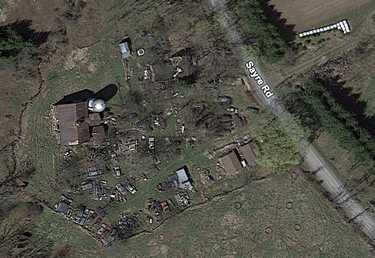DEC not taking action on Sayre Road property
— Photo from Google Earth
This property on Sayre Road, in Medusa, is causing a significant headache for the town of Rensselaerville. Supervisor John Dolce is intent on cleaning up this property, which, as seen in the photo, is littered with cars and debris, to give the town a better image and ensure that residents feel zoning laws are being enforced evenly.
RENSSELAERVILLE — The New York State Department of Environmental Conservation has determined that it has no reason to take action on a problematic property in Rensselaerville, meaning the town is on its own as it tries to clean up that Sayre Road and a number of other properties this year.
The Sayre Road property has been noted by the town board as the worst among about two dozen others that Rensselaerville hopes to get up to standard.
A Google Earth review of the 24-acre property shows it littered with a score of vehicles and what appears to be debris. The board also mentioned in June that there were several 55-gallon drums with contents unknown.
The dozen other homes on the rural L-shaped road connecting two segments of Fox Creek Road appear well tended.
The DEC told The Enterprise this week that an officer assessed the property last month and found that the drums were empty, and that no enforcement actions were taken based on the officer’s observations.
Town attorney William Ryan said at the board’s July meeting that the town was told there is a “litany” of reasons why the DEC won’t enforce clean-up of the property — among them that it’s a personal property and not a commercial dump — and that the town was awaiting the full report.
Ryan also said the town solicited an engineer to assess the property for its habitability, which would be an important step in enforcing the town’s zoning code.
“I understand that, to the naked eye, you can go out there and reach that conclusion,” Ryan said, “but we need proof, and we can’t do it without the engineer’s report.”
As The Enterprise reported last month, the town can rely on the state Supreme Court to enforce the laws if the owner doesn’t comply willingly.
The worry, however, is that there will be a steep cost for the town.
“The legal fees are insignificant compared to what I would think it would cost to demolish the structures — there’s two of them — and cart the material of the structures away,” Ryan said.
He said the town may be able to take possession of the vehicles on the property, which he believes are unregistered, and sell them as scrap to recoup some of the expense.
Supervisor John Dolce said, “That’s about six grand, just so you know.”
He said that the property got “out of control” over three decades, and that enforcement is critical because it’s likely unsafe, and is a stain on the town’s rural beauty.
Although the other properties that the town has on its list are not as bad, Dolce warned that, if they’re not taken care of, they’ll turn out like the Sayre Road property, and that lack of enforcement on one would hinder enforcement of the others if owners started questioning the town on its hypocrisy.
Board member Pete Sommerville expressed serious doubts about the need for enforcement on any of them.
“They’ve been there a long time and they’re not really, truly hurting anybody,” he said. “They are ugly but nobody’s really bothered by it. I don’t lose any sleep over it.”
He advised the rest of the board that “as these things unfold, I’m going to vote no on every one of them.”
Board member Randy Bates said he won’t be comfortable going forward until the board has a clearer idea of the total cost, which Dolce said he agreed with.
When the issue of land rights came up, Dolce said that owners can enjoy many freedoms on their land, they should recognize that they’re “stewards of that land,” and that it’s incumbent on them to protect it to some degree for future generations.
“We don’t own it for eternity,” he said.



